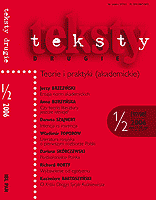Czy teoria literatury jeszcze istnieje?
Is there still A literary theory?
Author(s): Anna Róża BurzyńskaSubject(s): Literary Texts
Published by: Instytut Badań Literackich Polskiej Akademii Nauk
Keywords: Literary theory; theory; Derrida
Summary/Abstract: This article discusses the present-day status of literary theory. The title, provocative as it is, refers in the first place to the poststructuralist time, i.e. one of concentrated criticisms of theory as a literary-scientific discipline (particularly, the criticism on the theory of interpretation). Seen from today’s perspective, the current is, perceivably, a modern (autonomous, objective, general, universal, etc.) theory revised – i.e. a theory which is to provide scientific foundations for literary scholarship whose model has expired, according to poststructuralists. It is also apparent that poststructuralism has yielded several important new directions contributing to certain thorough transformations in theoretical knowledge. These include the pragmatic turn (i.e. a definite withdrawal from essentialist issues), the narrativist turn (altered views on the language of theoretical utterance), the ethical-political turn (autonomy of theory challenged). Those transformations have led to the emergence of the present-day form of literary theory, i.e. cultural theory, being an open-ended collection of various cultural discourses being useful in interpretative practices (ethnical, racial, postcolonial, feminist, gender-studies-related, queer-theory-related, etc.), rather than a coherent or comprehensive theoretical system. In the recent years, we have observed a tendency of rendering literary study reoriented into interpretation, the latter becoming the major duty of a literary scientist. As for theory, it is about to become an auxiliary discipline, a ‘knowledge for interpretative use’. This is confirmed, among others, by two most recent books on the status of theory in literary studies: life.after.theory (interviews with J. Derrida, F. Kermode, T. Moi and Ch. Morris) and T. Eagleton’s After Theory (2003) roku, both discussed at some length in the article’s conclusive section.
Journal: Teksty Drugie
- Issue Year: 2006
- Issue No: 1-2
- Page Range: 40-57
- Page Count: 18
- Language: Polish

